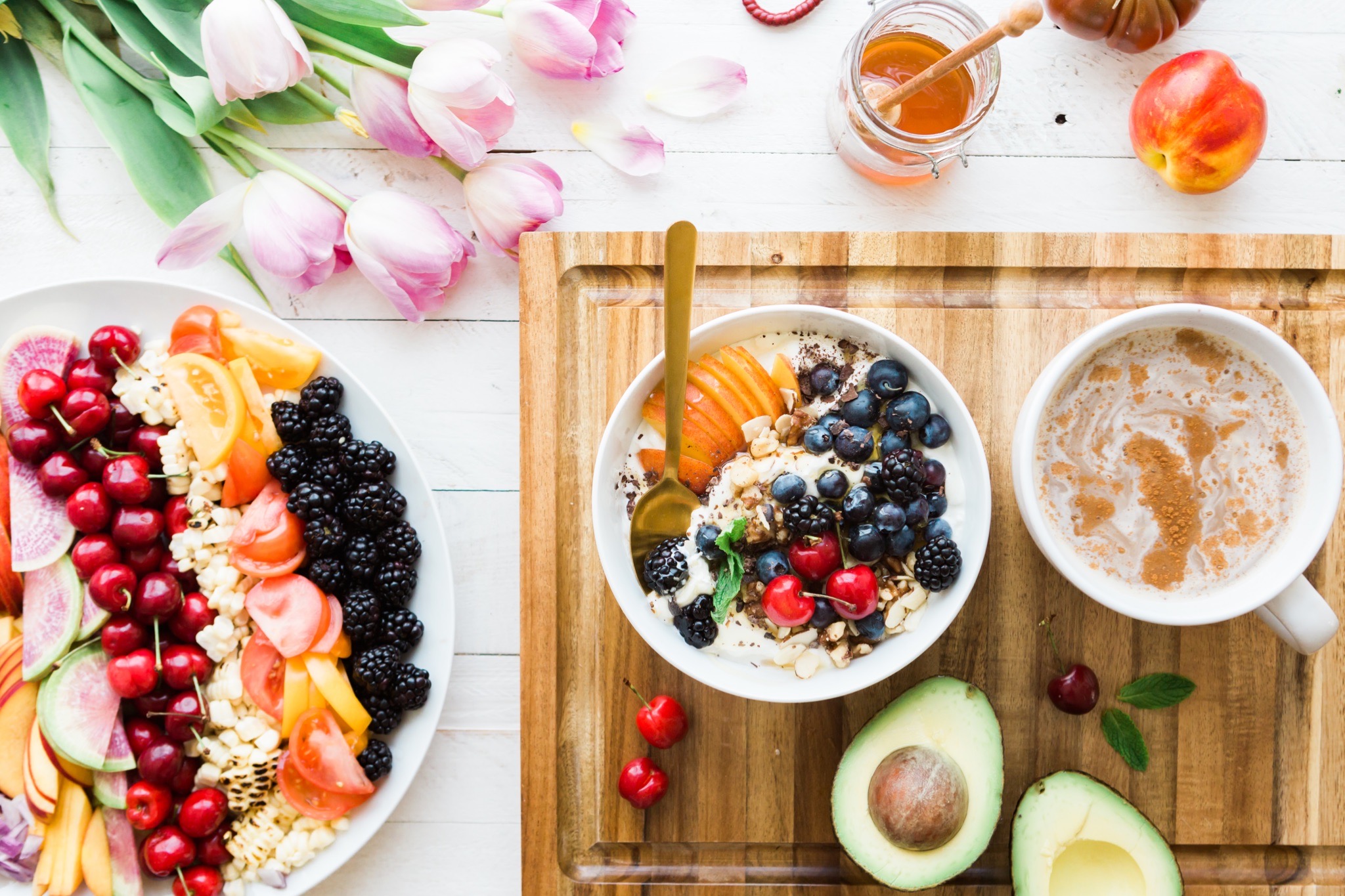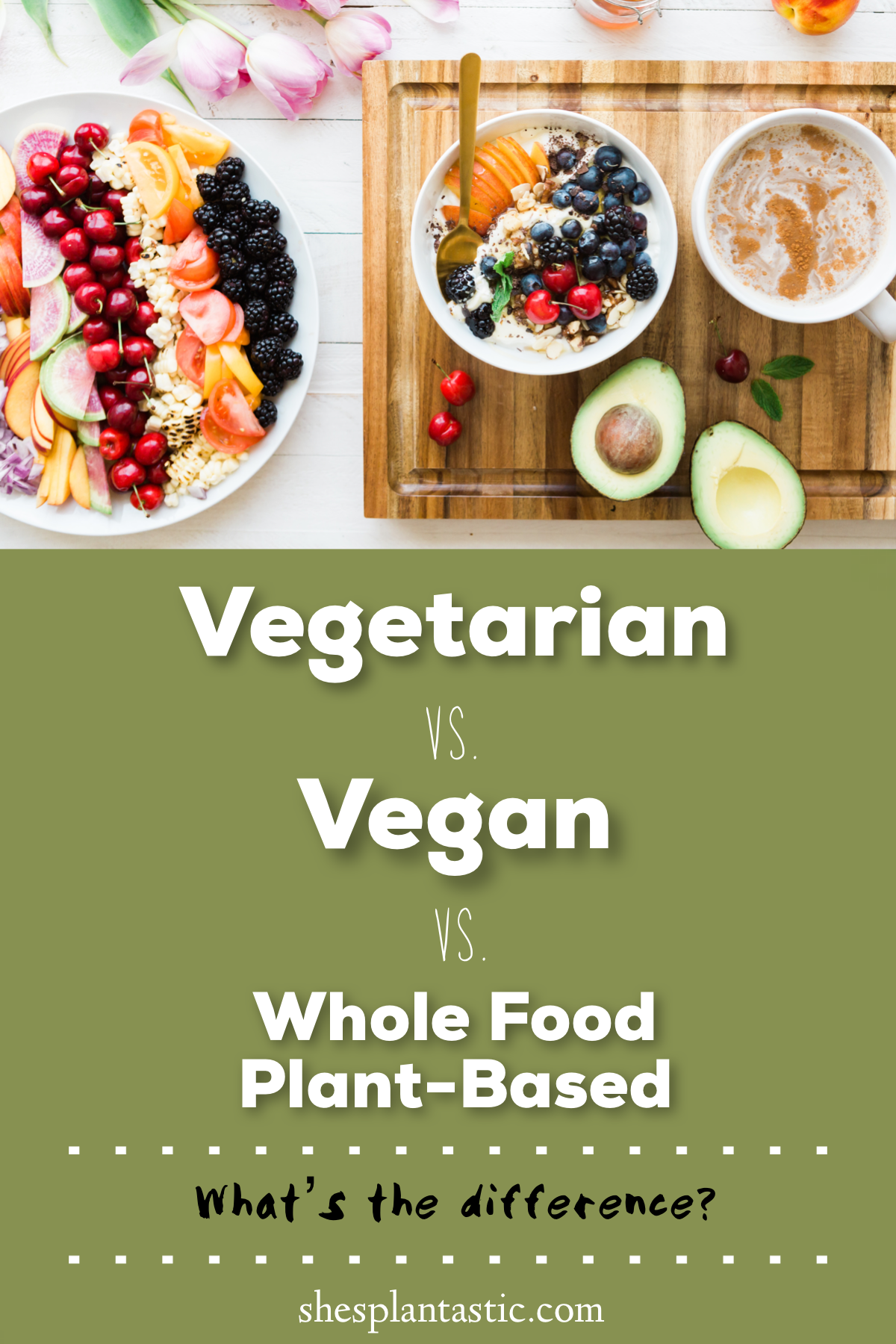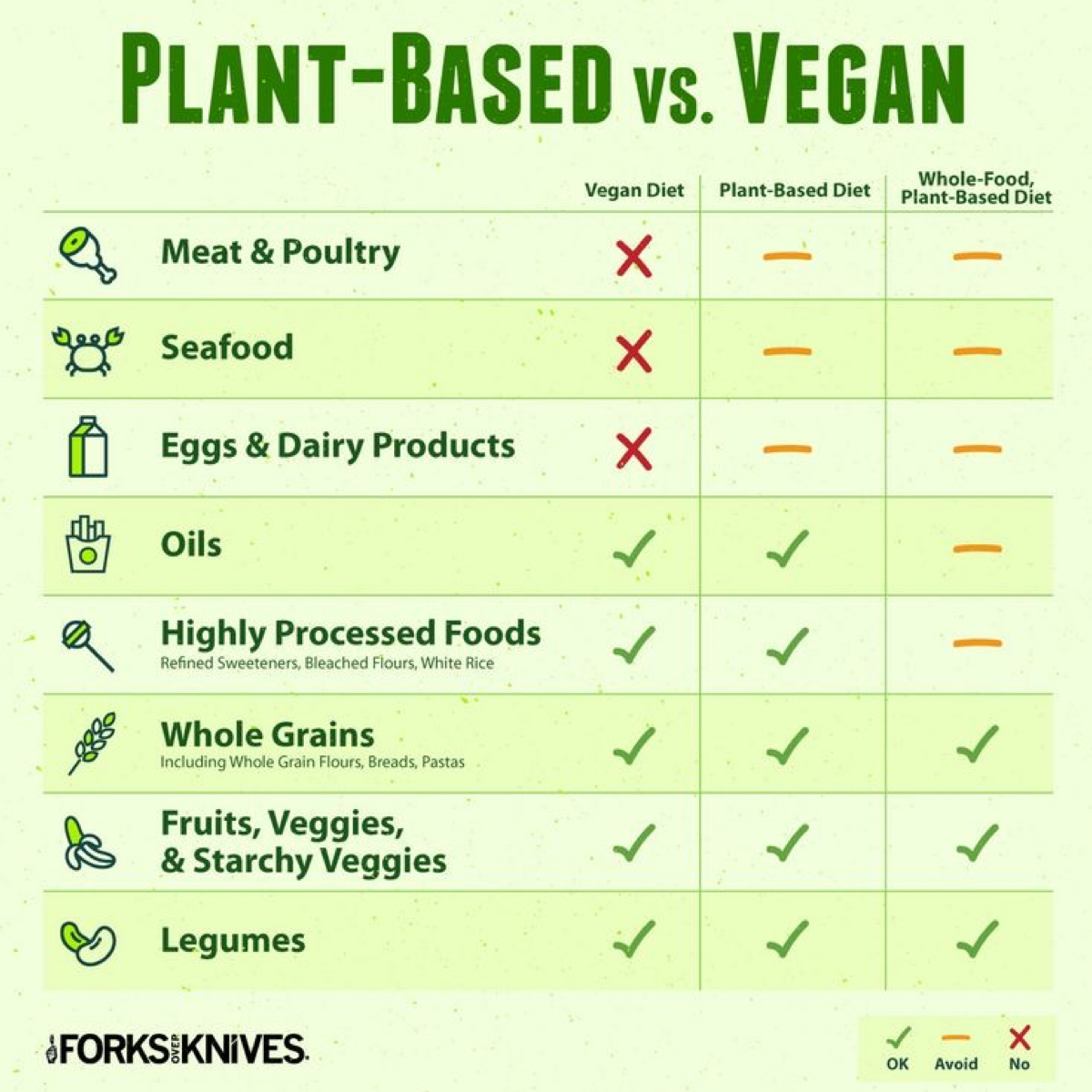Vegetarian, Vegan, Whole Food Plant-Based Diets: What’s the Difference?

Vegetarian. Vegan. Plant-based. Whole food plant-based. You might be familiar with these terms. Maybe overly familiar because of how much they are used in hardcore marketing and advertising these days clinging to current lifestyle and diet trends. They’re everywhere in stores, supermarkets, and in the media fighting for your attention (and money) to choose one as the best option for optimal health.
I remember going through each phase of these diets until I landed happily on a whole food plant-based diet. What an adventure that was! But in the midst of that experience, I remember feeling a little confused trying to decide what true healing was for a human body when all these titles promoted their own “health”.
Let’s explore what the differences between these diets are and discuss what’s going to benefit you the most. They are so closely related, but after all, one is going to reveal itself as the shining winner and you’ll quickly want to practice what it preaches.

Vegetarian
When I first started changing my diet, I went vegetarian. (You can learn more about why I did that here.) A vegetarian diet simply abstains from all meat, whereas dairy and egg products are fine to consume. It’s simply a meatless diet.
Vegan/Plant-Based
Like a vegetarian diet, vegan diets do not consume meat. Additionally, they avoid all dairy and egg products as well. Anything that’s an animal or came from an animal is prohibited.
Whole Food Plant-Based
There are two obvious principles found in the name:
-Whole Food: Where food is whole, natural, and unrefined or minimally refined. It is as close to their natural state as possible.
-Plant-based: This simply means that food comes from plants. It doesn’t include food products from animals which include meat, dairy, eggs, and even honey.
Vegan vs. Whole Food Plant-Based
A vegetarian diet is pretty easy to understand. It likes its plants and eggs garnished with cheese. But when it comes down to vegan and whole food plant-based eating, it can get a little murky navigating the subtle nuances between the two.
Check out this nifty chart from one of my favorite whole food plant-based resources, Forks Over Knives:

One of the biggest differences I see between a vegan and whole food plant-based diet is the mindset. Vegan diets are avidly against meat, dairy, and egg products whereas whole food plant-based diets strongly avoid these ingredients as well as oil and highly processed foods.
So in other words, we have a motivational difference. Vegan diets often reject animal products for ethical and environmental standards, while WFPB diets do their best to avoid these same products (including oil and highly processed foods) purely for personal health benefits. Of course there are many other reasons why anyone would choose to be a vegan or eat plant-based, but these are the most common – a motivation driven by society and a motivation borne through scientific research.
Let’s look at the differences between the foods.
A Comparison
A whole food plant-based diet revolves around these food groups:
-Vegetables
-Fruits
-Leafy Greens
-Nuts and Seeds
-Beans/Legumes
-Whole Grains
A vegan diet definitely includes the same food groups as a whole food plant-based diet, but it’s also open to foods like:
– fried food
– refined sugar (i.e. soda, Oreos, candy, ice cream, etc…)
– processed ingredients (i.e. products labeled “dairy free” or “vegan/plant-based” like crackers, pizzas, cheeses, burgers, frozen entrees, etc…)
Why You Should Avoid Refined Foods and Oils
This is the reason why in one word: inflammation. Studies have shown that within hours after consumption, fast food can stiffen our arteries and cut down their ability to relax on their own by half. After this, it can take even more hours for the arteries to recover until the next incident occurs.
If we take a moment to consider oil, all oils, you’ll find that it has the absolute least amount of nutritional benefit (nonexistent, really) out of all the foods you can eat. Oil is also the most calorie dense, about 4,000 calories per pound, so you’d be surprised what cutting back on oil will do for your body inside and out.
What does it mean when a food is refined?
Refining is the process of stripping a food of its original nutrients and fiber, leaving it deplete of these things that your body needs to thrive.
For example, whole grains are encased with the entire grain kernel, but when they are processed, the outer kernel is removed through milling which leaves behind a finer textured grain. Though this improves the grain’s shelf life, it comes at the cost of removing fiber, iron, and other vitamins that are packed in that outer kernel.
Because the nutrients and fiber are taken away, these foods leave your body feeling hungry again after as little as an hour later after a meal. It basically disrupts and complicates how your body processes the food. Consuming constant amounts of refined sugar, grains, and oils set your body up for many ailments like heart disease, obesity, high cholesterol, high blood pressure, cancer, and more.
There is good news, though!
Your body is designed to heal itself if you allow it access to the right tools. Dr. Michael Greger, a physician, author, and public speaker, said:
“The best kept secret of medicine is that the body heals itself if we create the right conditions. And stop doing the things that created the sickness in the first place.”
By simply focusing your diet on plant-based whole foods, you will relieve your body of damaging inflammation and bolster your body against harmful lifestyle diseases. I can attest that when I removed and/or severely limited my refined food and oil intake my body started to heal in awesome ways. For example, my cystic acne cleared and my chronic pain became manageable, if not gone. To read more things that happened to me, click here.
I now eat to heal; not to harm.
Why is Whole Food Plant-Based the Best Option?
When it comes down to health, a whole food plant-based lifestyle is the ultimate champion. Not only is it healthiest, but it is 100% sustainable throughout an entire lifetime.
Our processed food culture is the cause of our leading killer in the US: heart disease.
Some people may find this way of eating to be extreme. I even worried about what kind of judgment I would receive when I went plant-based in the beginning. This quote by Dr. Caldwell Esselstyn, a cardiologist and a whole food plant-based advocate, puts the “extremism” into perspective.
“Some people think the plant-based, whole foods diet is extreme. Half a million people a year will have their chest opened up and a vein taken from their leg and sewn onto their coronary artery. Some people would call that extreme!”
I am totally convinced that we will save ourselves and our rising generations a lot of heartache if we try to institute a happier, healthier lifestyle. Let’s use food as medicine instead needing medicine because of our food.
Some Personal Thoughts
In my opinion, a whole food plant-based way of eating offers an abundance of variety compared to these other diets. The creativity of colors and flavors surpass meals where meat, dairy, refined ingredients, and oils are the highlight of the dish. I’ve never found myself bored while living on a whole food plant-based lifestyle!
As we talked about a little while ago, a whole food plant based diet tries to avoid certain ingredients and encourages us to do our best with the knowledge we have accumulated. This really resonates with me because I like to make my own boundaries based on my own research about peer reviewed nutrition facts rather than basing my decisions on trends or marketing.
Although I do deeply care for my animal friends and the environment, those two things aren’t enough to motivate me to form a passion about my food choices alone. I’m a creative person, so this lifestyle is a great avenue to express myself through cooking.
For example, it appeals to my love for visual arts, following a well written instruction, and for seemingly endless opportunities to try something new! I always feel so good inside and out, mentally and spiritually, when I choose the best foods for my body.
You Can Do This!
I encourage you to make educated decisions for your own health and happiness! If you’re already on a vegetarian or vegan diet, explore the wealth of nutrition waiting for you as you cut down on processed foods and oil. Your body will LOVE you for it.
Or if you’re still thinking, “Melissa, you’re crazy”. Well, on one level, you wouldn’t be wrong, but check out my favorite list of resources I’ve compiled to aid you on your health adventure. Evidence based nutrition research will turn you into a believer! And remember, any baby step is a good step.
-Melissa
Love it ! I’ve always been curious about the lifestyle and wanted to try it but I’m not the best cook and I’ve never had a vegetable that wasn’t cooked in butter or bacon so I wouldn’t know where to start. Plus my family refuses to eat healthy foods. They wil literally chose to go hungry rather than eat veggies.
Thank you, Carla! Keep your eye out for posts in the future where I will share how to cook without butter, oil, or grease! I was intimidated by that, too, when I first started cooking plant-based, but I promise it’s super easy. Not everyone in my family likes certain vegetables either. I had to find a few vegetables that they approved of and increased the frequency that they ate it until it became normal. Then I slowly introduced new vegetables over time. I know it can be hard convincing family to make healthier choices, but take care of you no matter what. If you’re taking care of you, then you’re taking care of them and setting a great example. <3
This is a great resource. I am vegan and I have trouble finding meals. Thank you for the information.
Thank you, Andrea! Glad I could help!